The ePassport infrastructure is an important method of clearing passengers into the United Kingdom, with it being the primary method of clearing a European Union/European Economic Area and UK Citizens quickly.
But I’m sure we’ve witnessed more than one rejection from the ePassport gates (and have suffered the process more than once). That led me to compose a Freedom of Information Act Request to the UK Border Agency after going through more than a few rejections in 2018.
My reasons were that I wanted to understand what was going on with the infrastructure, and the success rates of using such a technology that is becoming such a core part of the passenger experience when entering the United Kingdom
The Freedom of Information Request
I submitted the following to the UK Border Agency, to see what information came back
Simple enough. My interest was the accept/reject rate – as I’m sure a lot of us have been on the wrong end of a machine when it decides you can’t enter the United Kingdom, and that you need to go for a secondary inspection to gain entry to the UK.
The result of the Freedom of Information Request
A result to my Freedom of Information arrived a few weeks ago, and I’ve been working on processing the information, as it’s pretty interesting, to say the least.
Number of ePassport Gates
Firstly – let’s look at the actual number ePassport Machines that have been rolled out. I’ve noticed them appearing… nearly everywhere, and the data that the UK Border Force gives out matches that impression
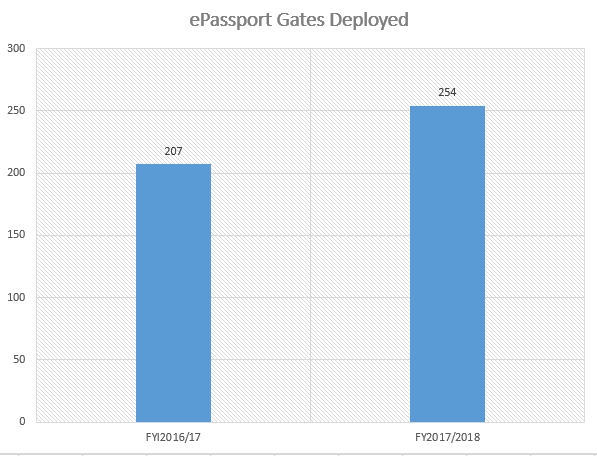
ePassport Machines deployed – Data – UK Border Agency, recoloured by Economy Class and Beyond.
It’s important to remember that the ePassport machines aren’t just installed at Heathrow Airport – you can find them at Birmingham Airport, Manchester, and at Paris and Brussels as part of the juxtaposition borders that are used as part of the Eurostar service. In this respect, it’s important to see a growth in the number in total being made available.
How many that are available for use at a particular point in time is another matter of course (and was not covered in the FoI request)
The usage of ePassport Gates
So let’s get onto more important information. We now know the number of ePassport Gates. But how many passengers do ePassport gates clear?
Based on data obtained by the UK Border Force, over 47.9 million passengers used ePassport facilities in the year 2017-18 – and it’s a growth number vs the 37.2 million cleared in the previous fiscal year.
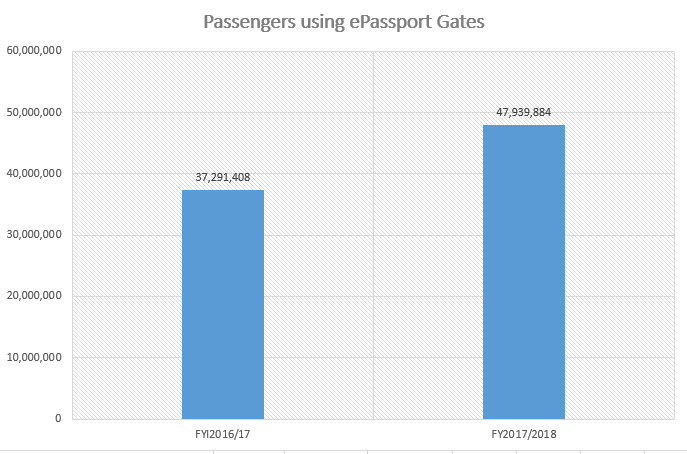
Data – UK Border Agency, recoloured by Economy Class and Beyond.
Here’s the actual data provisioned – with a net 10 million user growth between Fiscal Year 2016/17 and Fiscal Year 2017/18.

Raw Numbers – UK Border Agency, Calculations – Economy Class and Beyond
How many people were successful vs being rejecting using the ePassport gates?
This is where the answers get a lot more fuzzier and negative from the UK Border Agency – with them withholding the data under section 31 of Freedom of Information Act
The information is exempt from disclosure under section 31(1)(a) and (e) of the FOI Act. Section 31(1) (a) and (e) provide that information is exempt if its disclosure would or would be likely to prejudice (a) the prevention or detection of crime and (e) the operation of the immigration controls.
So it seems the UK Border Agency – whilst happy to share the numbers going into the gate system, aren’t so happy to share the actual accept/rejection rate.
In the ongoing FoI Request, it goes on to say in favour of releasing the data:
Border Force recognises that there is a general public interest in openness and transparency in all aspects of government. The release of information about unsuccessful E-Passport Gate transactions would help inform the public debate about the effective use of technology and the resilience of our UK borders. This information would help build greater public confidence in the operational measures undertaken to ensure that passengers are cleared at the border within the agreed service level agreements.
That sounds rather positive to release the information doesn’t it? Then the negative reasons pile in for not releasing the data
In this case Border Force has determined that providing the information would provide potential criminals with an insight on the technology used and the reasons some passengers are unsuccessful in the use of that technology. This, together with information obtained from other data and FoI requests, would provide useful information, especially to organised criminals, to increase their chances of circumventing UK immigration controls. There is clearly a strong public interest in doing everything we can to detect and prevent crime and protect the public at large. Disclosing the requested information would not be in the public interest as it could impact on the abilities of the police and Border Force to protect the UK border and ensure the proper operation of customs and immigration controls.
Protecting the UK border is, and always has been, of paramount importance to this Government. It has never been government practice, for reasons of national security, to comment on operational issues relating to border security. This includes offering commentary on the performance of border systems and of ePassport Gates specifically.
So no, whilst the numbers are good, releasing the information could lead to unintended and criminal use of it. If you choose to believe that – is of course – another thing entirely.
Why I believe this to be Freedom of Information request is important
I’m sure we’ve all been there, waiting in the border queue at Heathrow Airport. And things with ePassport gates could get even more interesting. As the UK moves closer to exiting the European Union, the last budget annoyed that it would that citizens of the following countries will be able to use ePassport gates across the UK infrastructure (and not just Heathrow. Airport).
These include citizens of
- Australia
- Canada
- Japan
- New Zealand
- United States of America.
In theory, a change like this should improve the passenger experience and improve the flow times through the airport. Anecdotal experience of using the APC clearance machines at Chicago O’Hare has solidified this viewpoint – where technology can improve the screening process.
The next steps
I wish I could take this further and try to extract some numbers of usage. But it seems whilst the UK Border force is happy to share the positive numbers, it’s failing to share the successful and rejection numbers.
Maybe if this was submitted to https://www.whatdotheyknow.com/, this might have got a little more attention and consideration for the data release. Then again, going through the Freedom of Information requests there are… minimal for the ePassport Infrastructure.
Therefore, I’m going to throw this open to the world – and those who are better than writing requests than I am. I’ve placed the data gathered at the following locations:
- The Freedom of Information Response – https://www.dropbox.com/s/erpe0byvz6cegfd/51017%20K%20response.pdf?dl=0
- The Data (Microsoft XLSX) – https://www.dropbox.com/s/lhekbp9mvw1e120/UKBA_Data.xlsx?dl=0
If you choose to re-publish and share this data, please cite as “Data: UK Border Agency via Freedom of Information Act request, Initial Analysis – Kevin Marshall, Economy Class and Beyond”
References:
- UK Freedom of Information Act – https://en.wikipedia.org/wiki/Freedom_of_Information_Act_2000
- https://www.gov.uk/government/news/epassport-gates-to-ease-travel-for-passengers-from-more-countries
- Photographic images: Authors own, Credit as Kevin, Economy Class and Beyond
- Graphs – Data based on UK Border Agency information, graphical representation by Economy Class and Beyond
Welcome to Economy Class and Beyond – Your no-nonsense guide to network news, honest reviews, with in-depth coverage, unique research as well as the humour and madness as I only know how to deliver.
Follow me on Twitter at @EconomyBeyond for the latest updates! You can also follow me on Instagram too!
Also remember that as well as being part of BoardingArea, we’re also part of BoardingArea.eu, delivering frequent flyer news, miles and points to the European reader..
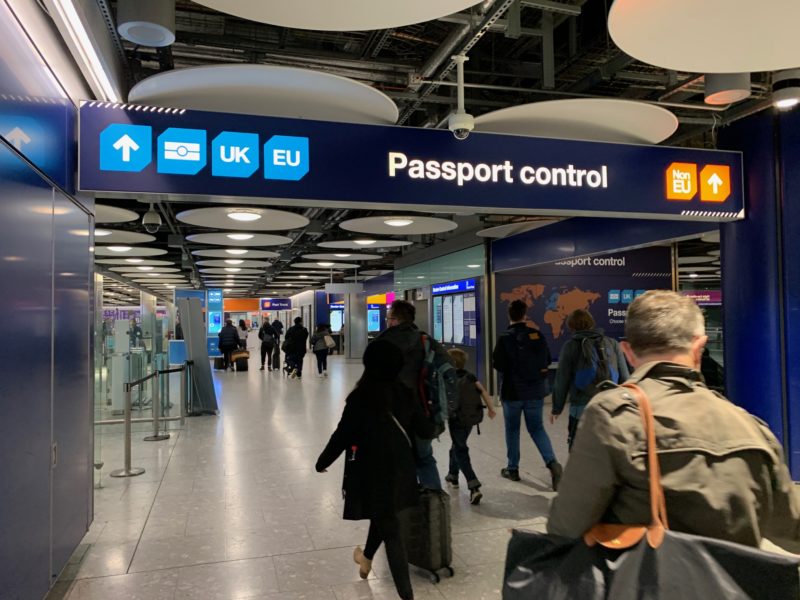
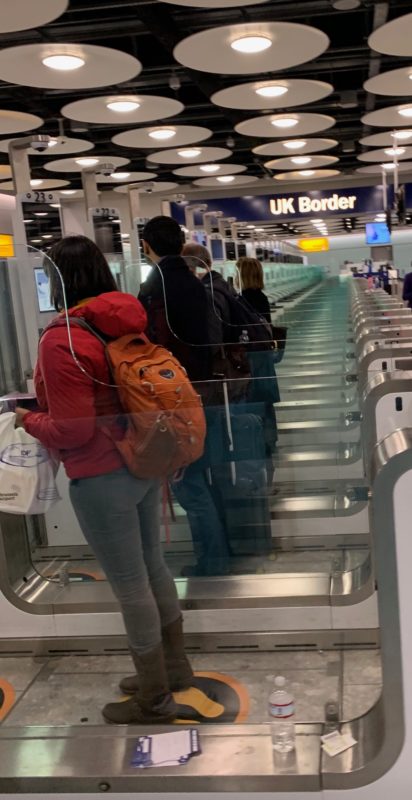
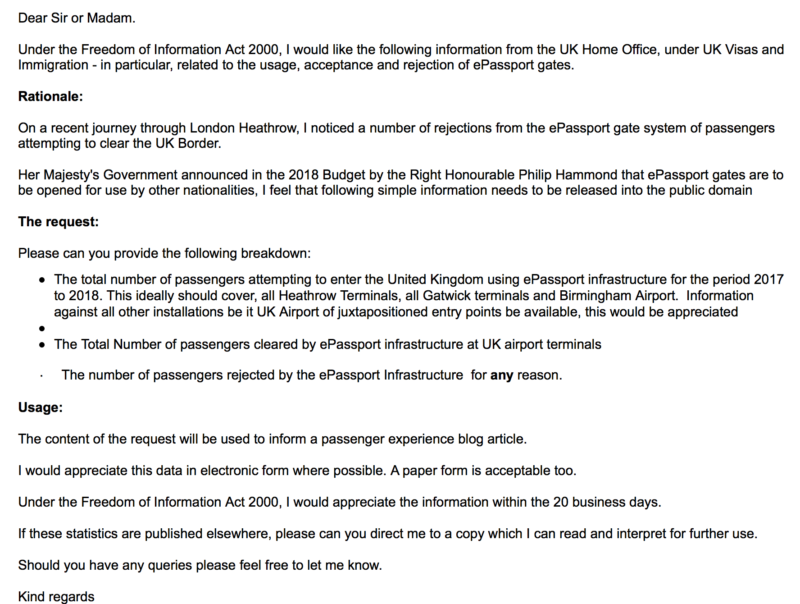
The real problem with slow border controls in the U.K. is lack of Border Force officers and the U.K. allowing an E.U. identity card to be used as a travel document; this is unacceptable. If we were to enforce high quality documents for entry, like the U.S.A. does, we would have many less queues as it is common knowledge that many E.U. ID cards can be forged.